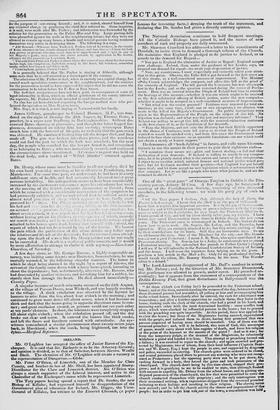The National Association continues to hold frequent meetings.' All the
Catholic Bishops have joined it, and the names of new members of rank arid property are daily announced.
Mr. Sharman Crawford has addressed a letter to his constituents of Dundalk, to incite them to demand a thorough reform of the Church. He maintains that England is pledged to do justice to Ireland, or to accede to the demand for Repeal- " You put to England the alternative of Justice or Repeal : England accepter your challenge. Ireland, then, under time guidance of her Leader, says, we Suspend our denten(' for repeal—we await your dispensation of justice. " Now. my conntrynieu, I utmost respectfully and earnestly solicit your atten- tion to this point. Obeerve, the Tithe Bill is put forward as the first overt act of this treaty, as a well-considered measure of improvement. The Alinister of•the Crown acknowledges the compact, and Weis this bill as the proof of.' the sincerity of England. The bill passed the COM1110114, but was afterwards lost in time Lonla ; and so the question remained during the recess of Podia-. meat. here was an interval when time People of Behind had tittle to consider time bearings of this measure—whether it was one which ought to be received as the first substantial offering of British justice, under the new compact-. whether it ought to be accepted as a well-considered measure of improvement. " But what was the course pursued ? Petitions woe renewed for total ex- tinction; at the same time. (with one or two exceptions,) no allusion was made to the bill of his 'Majesty's Government. No public instructi )))) s were given to the Representatives of the People on the subject of Ids bill. No objection was declared ; and what was the jast amid necessary inference? That Ireland was willing to accept this bill, with the nominal extinction contained in the first clause of it, as the liquidation of her demands. " Thus the Ministry, and not only time Ministry but their British supporters in the House of Commons, were led astray as to what the People of Ireland wanted or would be satisfied with ; and from this cause the Government were induced to base their existence on an unstable foundation—on one which could not obtain a steady or honest support."
He denounces all "bush-fighting" in future, and calls upon his eoun. tryinen to use the means in their power to gain their righteous ends- " I maintain three means are- plain and honest dealing—a full and clear declination of your demands. If Ireland is willing to accede to any compro- niise, let it be plainly stated what is the extent and nature of that compromise. I object to no sacrifice avilich national honour and national justice would per ; hut let Irishmen recollect their position—that England has put herself upon trial ; and let them accept no new legislation which is not consistent with that compact. Let its act like a people who know what justice is, and are dos tenniued to obtain it."


























 Previous page
Previous page